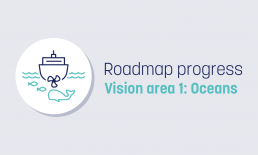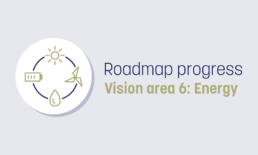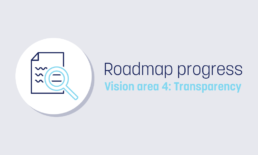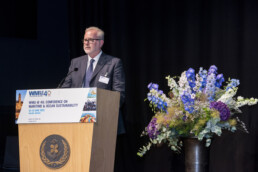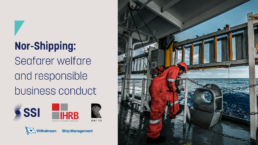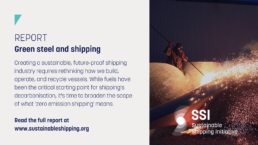High Seas Treaty
Progress against milestone 1.2040.2:
High seas and coastal marine protected areas are established and enforced, and marine spatial plans are in place
The United Nations adopted the world’s first treaty to protect the high seas and preserve marine biodiversity in international waters. The treaty is key to protecting 30% of the world’s land and sea by 2030.
The treaty will go into effect after it has been ratified by 60 countries. Countries can become signatories after September 20, 2023.
Source: The Guardian
Science Based Targets for Nature
Progress against milestone 1.2030.1:
Shipping-related ocean governance is strengthened, with improved coordination on ocean impacts and issues and ramped up enforcement of laws and regulation
Science Based Targets for Nature launched.
Technical guidance for the protection of biodiversity in land and sea has been published for the first steps of the process. Additional guidance on Act and Track will come in 2024.
Source: SBTN
IMO issues guidance on plastic litter reduction
Progress against milestone 1.2030.1:
Shipping-related ocean governance is strengthened, with improved coordination on ocean impacts and issues and ramped up enforcement of laws and regulation
The GloLitter Partnerships project published updated national guidance on plastic litter.
The guides help countries in efforts to prevent and reduce sea-based marine plastic litter (SBMPL), focusing on how to prepare detailed country status assessments and national action plans.
Source: IMO.
Fit for 55 includes maritime emissions
Progress against milestone 6.2030.2:
Mid- and long-term measures implemented and national regulation incentivising and ensuring the uptake of zero (or low) carbon fuels and technologies in place.
The European Council includes shipping in efforts to cut emissions.
As part of ‘Fit for 55’ package, emissions from shipping will be included within the scope of the European Union Emission Trading Scheme (EU ETS).
Source: European Council.
Aronnax Podcast: Ships and their steel. Turning it Green.
As the shipping industry moves into an age of new fuels, its operations will become less GHG intensive, and interest will move to the next GHG lifecycle factor in the sector – the steel.
The Sustainable Shipping Initiative’s (SSI) new report on greening the steel and closing the loop so recycled steel can be accounted for was published this month.
In this podcast, supported by Lloyd’s Register, we look into the links that bond the decarbonisation of the steel industry with the shipping industry and what Green Steel means for shipping.
Panellists:
- Nicoló Aurisano, Sustainability & LCA specialist, A.P. Moller-Maersk
- Andreea Miu,, Head of Decarbonisation, Sustainable Shipping Initiative
- Milena Matijasevic-Clarke, Senior Specialist Metallurgy, LR MNDE Marine & Offshore, Lloyd’s Register
- Dewi Wesselman, Group Sustainability Coordinator, Damen Shipyards
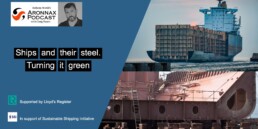
Germany's Act on Corporate Due Diligence Obligations in Supply Chains
Progress against milestone 4.2030.5:
Sustainability performance data is audited, validated and made publicly available.
Germany’s act on Corporate Due Diligence Obligations in Supply Chains came into force on 1 January 2023, putting the legal responsibility on German enterprises to respect human rights in global supply chains.
Source: CSR in Deutschland
SSI at WMU@40: Conference on maritime and ocean sustainability

20 June 2023 – The Sustainable Shipping Initiative was invited to give one of the opening presentations for the conference. Below is the speech given by Andrew Stephens.
“Good afternoon, your excellencies, distinguished guests, students, and the wider WMU family. Congratulations to the WMU on your 40th anniversary. Thank you for inviting the Sustainable Shipping Initiative to speak today.
We are halfway through 2023, and extensive wildfires plague Canada, Australia, and Spain. Severe heatwaves have caused record April temperatures across much of Asia. The Horn of Africa is experiencing its most severe drought in history, and sporadic rains have caused devastating flooding.
These events have unfortunately misplaced hundreds of thousands of people, ruined countless livelihoods and ecosystems, and ended many lives. This is the result of climate change. We are seeing triple planetary crises develop before our very eyes: climate change, pollution, and biodiversity loss. These crises are interlinked and worsened by our current global system. Change needs to happen, and shipping must be a part of this change.
Shipping will continue to exist in a zero-emission future. It will remain a crucial industry in keeping global supply chains moving. It must adapt now to ensure a smooth transition into the future.
For most of the industry, energy and emissions have been the focus. But as the impacts of the triple planetary crisis become abundantly clear, a systemic approach to sustainability is necessary.
Sustainability spans environmental, social, and governance issues. At the Sustainable Shipping Initiative, we have translated this into a Roadmap to a sustainable shipping industry across six vision areas: Oceans, Communities, People, Transparency, Finance, and Energy. The Roadmap, after which the programme of this conference has been modelled, is a resource for stakeholders across the maritime value chain to navigate pressing sustainability challenges that the industry faces today, with interconnected milestones and pathways pertaining to each vision area. Initially created in 2016 and updated in 2020, the Roadmap is now commencing its third round of updates to reflect the everchanging maritime landscape. The next iteration of the roadmap will track the State of Sustainable Shipping.
All of these iterations have been vital because the industry is changing and adapting. Progress is happening across all vision areas.
Oceans
The ocean is the foundation of life. Shipping must contribute to responsible oceans and the healthy use of marine resources. In 2022, amendments to the London protocol removed sewage sludge from the list of permissible wastes that can be dumped at sea, leading to cleaner oceans. At the end of that year, The United Nations Biodiversity Conference (COP15) resulted in the adoption of the Kunmig-Montreal Global Biodiversity Framework which aims to address biodiversity loss, restore ecosystems, and puts 30% of the planet under protection by 2030. And this March, countries agreed to the historic High Seas Treaty on the conservation and sustainable use of marine biodiversity in areas beyond national jurisdiction.
Communities
Already, a majority of ports are exposed to natural hazards such as cyclones, earthquakes, and flooding. This is putting $63.1 billion of trade at risk globally, particularly in Small Island Developing States. Supporting and protecting ports, coastal, and indigenous communities are crucial to achieving a successful, sustainable industry. In 2022 piracy was at an all-time low, and this trend has continued into 2023. And port initiatives, such as the Port of Vancouvers’ EcoAction program use discounted harbour dues to incentivise the reduction of environmental impacts.
People
The world’s 1.9 million seafarers deserve a healthy, safe, and secure work environment so that they can enjoy rewarding careers and achieve their full potential. Over the last two years, there has been an increased focus on protecting seafarers’ rights, from the Norwegian government pledging to ensure that Norwegian wages and working conditions apply in national waters, to the UK Seafarers Wages act which protects workers on vessels in British waters from being paid less than the British national minimum wage. And in the Philippines, the Magna Carta for Filipino Seafarers’ sets out labour protection terms for Filipino seafarers throughout their employment.
Transparency
Improving transparency and accountability levels the playing field for all. It drives performance improvements and enables better, sustainable decision-making. The EU Sustainability reporting directive facilitates this. Under the Directive, all large corporations operating within the EU will need to disclose data on the impact of their activities on people, the planet, and any sustainability risks exposed. This will inevitably impact shipping.
Finance
Finance has a key role to play in enabling a sustainable shipping industry. Developing financial solutions that reward sustainable performance and enable large-scale uptake of innovation, technology, design, and operational efficiencies is vital. The International Climate Bonds Standard launched its Shipping Criteria, providing shipowners and operators with technical guidance to evaluate whether a shipping project or asset contributes to climate change mitigation, and more recently, the Poseidon Principles tightened their environmental benchmarks to include the Paris Agreement temperature cap of limiting planetary warming to well below 1.5°C.
Energy
The latest IPCC’s message was clear, we need to act now to limit global temperature increase. It is crucial for shipping to reach zero emissions by 2050 in a way that is resource efficient, responsible, and avoids negative biodiversity impacts. The Science Based Targets Initiative launched their maritime guidance, a framework for the shipping industry to set near- and long-term science-based targets that align with the Paris Agreement. Regionally, the EU has also set a variety of measures to reduce emissions in shipping, from FuelEU Maritime to including shipping in the Emission trading scheme. And hope remains for ambitious decarbonisation targets to be set at IMO MEPC80 in a couple of weeks.
This is all progress.
Change is accelerating, but urgent action is needed. More needs to happen, quickly. Over the next few days, you will hear from various leaders about their actions to propel a resilient, sustainable shipping industry. I encourage you all to remember these learnings and be part of the change you want to see in the world. To all of the organisations here today, I ask you all to continue raising your ambitions and show the world that shipping will be a leader in catalysing this change.
Many will worry about finance. Can we afford to do this? The harsh reality is that we cannot afford not to. We cannot continue to talk finance on a dead planet. Investing now will deliver for companies, societies, and the planet. Investing now will ensure our future.
Sustainability issues are interconnected, and they require a collaborative systems approach to tackle them and build a future-proof, efficient industry. This is a collective endeavour that requires collective accountability.
Together, we can do this.”
SSI presents at the Green Shipping Project
24 May 2023 – Various stakeholders, from academics to industry, gathered in Vancouver for the Green Shipping Project partnership meeting to discuss ‘Governing Green Shipping Transformation: Pathways to Maritime Sustainability’. Andreea Miu, SSI’s head of decarbonisation, participated in a session on ‘Transforming the lifecycles of shipping, fuel, and infrastructure’.

Transforming lifecycles
‘Lifecycle phases’ are often categorised into pre-production, production, transportation, use, and end-of-life. The lifecycle of ships, materials, and infrastructure tend to have very long use phases – to the magnitude of decades – and the end-of-life treatment requires careful consideration of material waste hierarchies.
Embedding circularity and rethinking the use phase of ships and infrastructure can transform lifecycles. Reusing materials and extending the lifetime of a ship or infrastructure is a good starting point. Designing for modularity – where parts of a vessel can be refurbished and replaced – builds unto this by allowing materials to be reused and refurbished.
At end-of-life, recycling systems need to be re-evaluated to ensure that they are operating optimally and resources are used efficiently. Steel from ships is considered high quality, yet once a ship is dismantled, its steel ends up either being re-rolled or pooled together with scrap from other sources and melted. The resulting products usually being used in local/national industries. Thus, there is great potential to optimise resource efficiency within ship recycling.
Shipping needs to decarbonise in order to keep planetary warming to below 1.5°C. Using high-quality scrap steel to produce new high-quality steel could be a solution to decarbonising the lifecycles of assets and materials used in shipping, this reducing Scope 3 emissions.
Improving the collection and sorting of scrap steel and ensuring that shipping’s high-quality scrap steel is used for high quality applications is crucial to transforming the lifecycle of materials where ships and infrastructure are concerned. In addition to this, cross-sectoral collaboration on reducing steel emissions is necessary, as the steel sector is responsible for 7-9% of global carbon emissions.
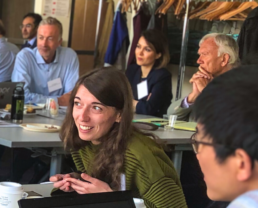
Towards a sustainable, decarbonised shipping industry
Andreea was joined by joined Nicholas Schneider, director of environmental, social and corporate governance & projects at Teekay, and Eleanor Kirtley, senior program manager at Green Marine. Some key takeaways:
- Shipping emissions and other externalities cannot be shifted upstream and downstream. For the decarbonisation transition to be successful, it also needs to be environmentally, socially, and socioeconomically sustainable.
- We cannot be risk-averse – trial and error and a diverse set of solutions are required to advance. The future shipping sector will incorporate a multitude of fuels and technologies to achieve zero emissions.
- A fragmented industry will limit progress. Collaboration and regulation at a global level are key to uniting action, and we all have a role to play in moving the needle towards a sustainable shipping industry.
—
SSI’s Green steel and shipping report explores the potential for green steel, its use within shipping, and how steel production, shipbuilding and ship recycling can be adapted to embed circularity principles throughout. The report outlines drivers and barriers to closing the loop on steel in shipping, from rethinking business models to increasing transparency and traceability.
The Green Shipping project is an international maritime research network that brings together academia, industry and governments on environmental improvements in the maritime supply chain. funded by the Social Sciences and Humanities Research Council of Canada.
Nor-Shipping: Seafarer welfare and responsible business conduct
“Poor working conditions cannot and should not be a competitive advantage”
Out of sight, out of mind
5 June 2023 – Wilhelmsen Ship Management CEO, Carl Schou, opened the event, taking place at the Wilhelmsen tent set up at Aker Brygge during Nor-Shipping. He emphasised that the challenges of seafarer welfare are not new nor are they unsolvable – in fact, we know what the solutions are, from adequate rest periods, to internet access, to recreational facilities on board. In a sector already dealing with an emerging labour shortage, making seafaring an attractive career is crucial. However, the needs of seafarers are not being responded to despite the solutions being clear.
This is a collective challenge that requires collective solutions. Schou pointed to the Delivering on seafarers’ rights Code of Conduct, which identifies some of the key pain points for seafarers as a sign of progress. Additionally, going beyond current regulation and towards an equitable workplace is the right thing to do to, make seafaring attractive now and in the future – acknowledging the crucial role seafarers play in the global economy.

Jostein Hole Kobbelvedt, CEO of the Rafto Foundation for Human Rights, pointed to the progress shipping is making on emissions reduction and the need to ensure that the transition is just, considering the rights and needs of workers across shipping.
“I look forward to the day where self-assessments are not voluntary but mandatory”
Verification and transparency
SSI Executive Director, Andrew Stephens, noted that the Delivering on seafarers’ rights Code of Conduct and self-assessment are the start of a journey to lasting change to the relationship between shipowner and charterer. In creating new norms for the industry, evidence requirements and tracking progress are key to showing that change is happening.
Since the Code of Conduct and self-assessment questionnaire were launched in October 2021, a total of 252 companies have completed their self-assessments covering a total of 6,609 vessels (data up to 23 April 2023). The next step is to build transparency into the process, as data is essential to assessing the current state of affairs for seafarers as well as any progress taking place in the future. In addition to this, assurance will be needed if the data is to be trusted and used within supply chain due diligence processes, as well as for seafarers’ own employment and career choices.

On stage, a panel of speakers discussed the topic of verification and transparency, emphasising:
- We don’t need to do this alone. Shipping can learn from other sectors that have tackled similar human and labour rights issues.
- Poor working conditions cannot and should not be a competitive advantage.
- Regulation is rapidly changing the landscape, with the Norwegian Transparency Act and the EU Corporate Due Diligence Directive changing the way manning agencies operate.
- Every actor has a role to play: from financial stakeholders who can exert their leverage to drive positive developments, to flag states who can set new norms and port states (as well as ports themselves) who can strengthen enforcement.
- Ship managers in particular play a crucial role, as they are responsible for creating a safe workplace and healthy organisational culture, working directly with seafarers to build awareness of their rights, and addressing issues quickly and effectively, building trust with seafarers that their rights will be respected.
Recruitment fees
Jostein Kobbelvedt moderated a panel on the issue of recruitment fees, following research published by IHRB and SSI in April 2023 which found almost 40% of those responding had experienced some form of unethical or illegal action, and of those, 70% reported having been asked to pay recruitment fees to manning agents to secure a job or have found that job offers were fake after making payments.
However, recruitment fees can take many forms, both cash and non-cash related, e.g., securing visas, permits, training certificates, etc. Debt bondage, in turn, increases the risk of forced labour and restriction of movement (through e.g., withholding travel documents). The issue has been documented across the maritime value chain and associated sectors, including shipbuilding and offshore platforms, among others.
Under the employer pays principle, workers such as seafarers should not be asked to pay at any stage of the recruitment process. However, current practices are very ingrained, and change needs to happen at all stages. The panel agreed:
- Transparency on recruitment processes is needed, as well as sharing learnings widely so others can benefit from them, both within and across sectors.
- Country-specific progress and learnings are needed, as well as national legislation to push for progress at the source.
- Education and awareness are still needed at the seafarer level, as in some cases recruitment fees are known, but not recognised as illegal. A cultural shift, where there is widespread understanding of what is and is not acceptable, needs to happen.
- Acknowledging the problem of recruitment fees and working to address it transparently can help raise awareness and understanding of the issue as well as progress being made.
Ultimately, seafaring provides an income, and as one of the panellists pointed out: “when you are the sole breadwinner in the family you will pay to be able to go onboard”. Change, therefore, needs to happen at all levels – from the shipowner and operator to the manning agency, to the training or educational institution, to the seafarers themselves.

For more information on recruitment fees in shipping:
- The Ship Lifecycle – Embedding Human Rights from Shipyard to Scrapyard (IHRB, Danish Institute for Human Rights, Rafto Foundation, 2019)
- Seafarers and Recruitment Fees (IHRB, SSI, 2023)
- Recruitment scams (ITF Seafarers)
Green steel and shipping
The steel industry is responsible for 7-9% of global GHG emissions, and as a primary shipbuilding material, steel is a primary source of Scope 3 emissions for shipping. The Green steel and shipping report explores the need to expand the scope of decarbonisation beyond fuel emissions to enable a future-proof, sustainable shipping industry.
Building on previous research into circularity in shipping (see 2013’s Closed-loop materials management and 2021’s Exploring shipping’s transition to a circular industry), this report examines how rethinking current steel production, use, and recycling can unlock opportunities to embed circularity and decarbonise across both industries.
The report discusses current steel production and decarbonisation efforts, the potential of closing the loop in shipping, and identifies a number of drivers and barriers to achieving greater circularity for the maritime sector. Among others, the need for greater traceability across the ship lifecycle, as well as increasing regulation around sustainability and emissions reporting, are discussed.

